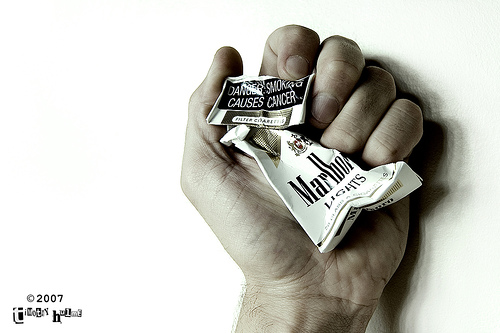Last month I posted about some interesting research being done in the field of embodied cognition–that is, how physical actions affect the way we think. The post, called “Can Just Grabbing a Pen Boost Willpower?” expressed my cautious interest in the idea that contracting muscles–for instance, by holding a pen tightly–could increase a person’s immediate willpower–that is, their ability to choose long-term goals over short-term goals, like losing weight over enjoying a piece of chocolate cake.
Five solid experiments
Since I had only had the opportunity to read an article about the work being done and not the original paper, I could only talk about the subject in a general and very qualified way. After I posted on the subject though, I was pleased to get an e-mail from Dr. Aparna Labroo of the University of Chicago Booth School of Business, one of the paper’s co-authors (with Iris Hung), and she very kindly offered to forward me a copy of “From Firm Muscles to Firm Willpower: Understanding the Role of Embodied Cognition in Self-Regulation.”
After reading the paper, I’m able to express much better-informed enthusiasm for the idea. It details the methods and results of five studies conducted by the paper’s authors, each one examining a different aspect of how contracting muscles might affect willpower. The studies appeared to me (a well-informed layperson, but a layperson, so take my assessments with skepticism as needed) to be very well-designed psychological studies intended to provide meaningful, measurable data that tease apart the many questions this issue brings up.
How it works
To summarize the findings briefly, here are some high points:
- Contracting a muscle when attempting a task seemed to boost willpower consistently in a variety of situations.
- Which muscles were contracted didn’t seem to matter much: hand, leg, and arm muscles all seemed to work equally well.
- The boost was only to immediate willpower with something being attempted at that moment, and it only worked if the person really cared about the long-term goal involved. For instance, contracting a muscle didn’t help people buy healthier snacks when they didn’t care whether or not their snacks were healthy; it only did so with health-minded individuals.
- The willpower boost helped with a variety of situations, including helping others even when it was uncomfortable to do so, enduring discomfort, making healthier choices, and persisting with an unpleasant but beneficial task.
- There wasn’t any indication that contracting muscles did anything to aid long-term willpower; the help seemed to come only at the moment it was being done.
- The person benefiting from the willpower boost doesn’t have to know what’s going on for the effect to be realized.
- Relaxing muscles or didn’t have any significant impact on willpower in either direction.
- Most or all of the observed willpower boost seemed to come by way of self-talk. For instance, a person clenching a pen might think more positive or encouraging things than a person who was holding a pen loosely.
- Simply knowing about a connection between clenching muscles and improved willpower seemed to help subjects in one situation exercise more self-control, presumably because they tried the idea out.
Of the many things we can do to boost willpower, this may well be the easiest I’ve yet seen, and while it appears to be effective for only short periods of time, very often that’s all we need. As Dr. Labroo has said, “this is no self-control magic pill.” However, it does seem like a useful tool to sometimes push things in the right direction just when a push is needed.
Photo by davco9200










